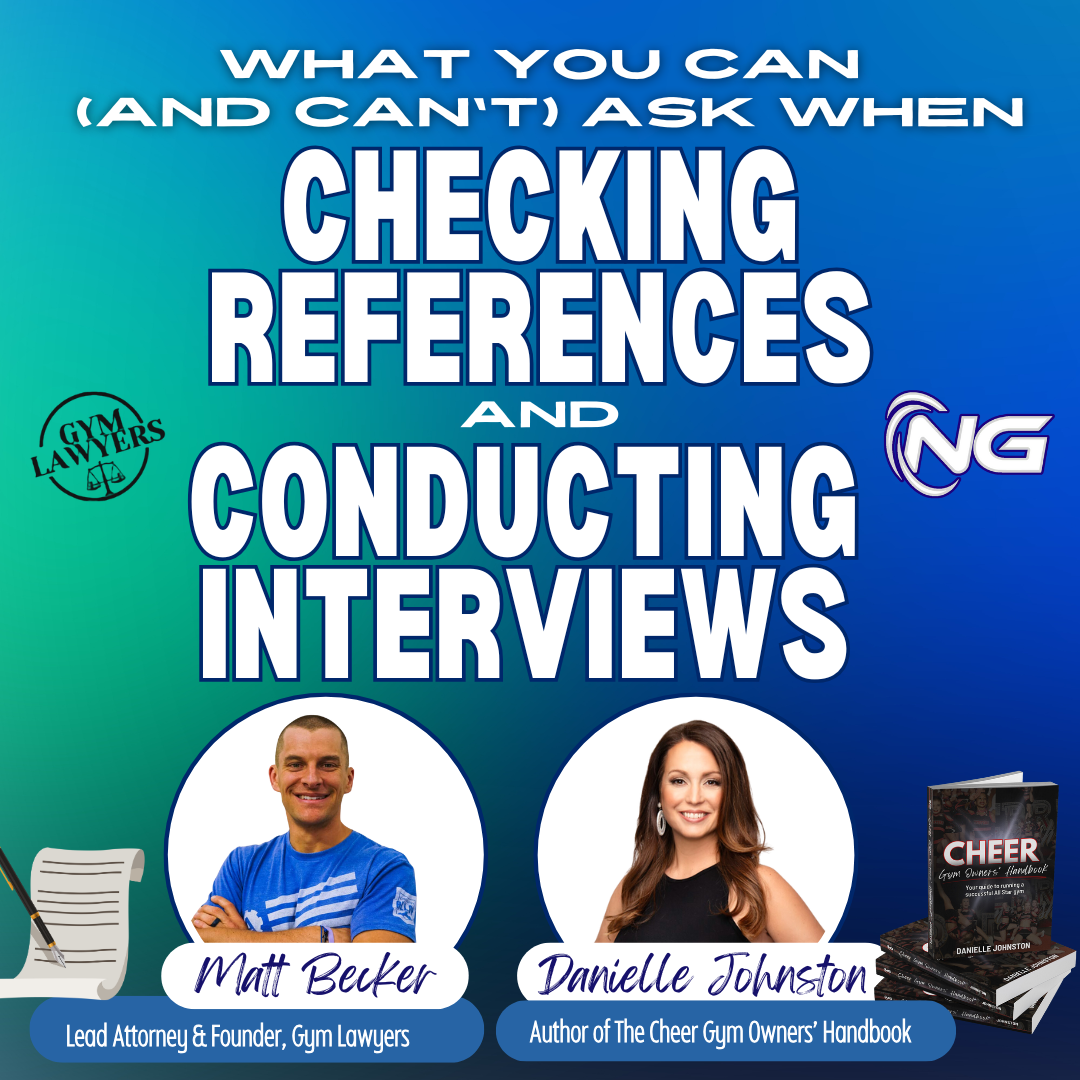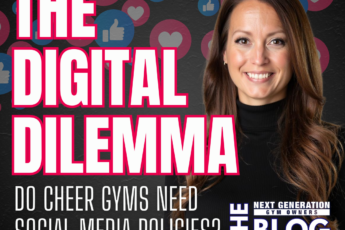Recently during a call, a client told me about a strange situation he was facing with a potential employee. He had interviewed someone and was ready to send an offer letter when he thought, “I should check the references first.” Luckily, the first reference was a friend he had known for many years who owned a gym a couple hours away.
That’s when he called me and said, “I really want to hire this person, but his former employer didn’t have the best things to say about him. I wanted to ask more questions, but I know there are some legal restrictions on what I can ask. I think I can follow up and dive deeper in a second interview with this employee, but even then, I’m not sure what’s legal to ask.”
That got me thinking. Though I was able to craft some very open-ended questions so he could keep the ball moving forward, it was important that we spoke to an expert. So, I reached out to Matt Becker, owner of GymLawyers.com and long-time preferred partner of Next Generation Gym Owners. Not only is Matt an expert attorney, but he understands the gym industry, and for the past few years, he has learned a ton about the all star industry to help our clients navigate the legal system. Here’s what Matt had to say about this:
Illegal Questions to Ask When Calling References for a Potential Employee
When checking references for a potential employee, it’s crucial to follow legal guidelines. Certain questions are off-limits because they could lead to discriminatory hiring practices. These illegal questions relate to protected characteristics covered by Equal Employment Opportunity (EEO) laws.
Here’s a list of topics you cannot ask a reference about:
- Age: You cannot ask about the candidate’s age or plans for retirement.
- Race, Ethnicity, or Nationality: Questions about race, ethnicity or the candidate’s country of origin are prohibited.
- Religion: Do not ask about religious beliefs or practices.
- Gender or Sexual Orientation: Avoid asking about the candidate’s gender identity or sexual orientation.
- Marital Status or Family Planning: Questions about marital status, plans to have children, or family arrangements are illegal.
- Disability: Avoid asking about medical conditions or disabilities unless it’s directly related to job performance.
The Same Rules Apply to Interviews
If a question is illegal to ask in an interview, it’s also illegal to ask when calling a reference. Stick to job-related questions that focus on the candidate’s performance, skills, and work history. Avoid any questions that touch on personal or protected characteristics.
OK, so while some of that may seem obvious, I can’t say I’ve never used, “So, do you have kids of your own?” as a way to get to know someone. In fact, I live 10 minutes from an Air Force Base, and I have, many times, found myself wanting to know if a potential coach is a military spouse or not. I’d truly hire her either way, but it allows me to know if I can keep her forever or if we’ve got a limited time with her before the Air Force moves her. Simply asking, “Are you married?” as a way of opening the door to learn those things is, in fact, illegal.
I’ve also talked to plenty of gym owners whose staff members have asked to bring their kids to work. First off, my answer is “no” 100% of the time; I have to maintain boundaries, and for me, that’s a big one. However, I can’t blame gym owners for wanting to know if a lack of childcare will be an issue with potential employees. That said, don’t ask. According to Matt, it’s not legal.
Then Matt and I started talking about answering reference checks on former employees. Good managers want to see what information they can find out about potential employees before they bring them on the team. As I told Matt, I’ve seen every episode of “Suits,” but they never quite covered this subject, so I’m going to refer to him:
What Former Employers Shouldn’t Share During a Reference Check
As a former employer, you need to be careful when providing references. Sharing the wrong information could lead to legal issues like defamation or privacy violations. Here’s what to avoid:
- Personal Information: Don’t share details about the employee’s personal life, like family matters or health issues.
- Unproven Allegations: Refrain from mentioning rumors or unverified claims about the employee. Only share factual, job-related information.
- Discriminatory Remarks: Just as certain questions are off-limits for employers calling references, they are off-limits for former employers when sharing details. Avoid discussing race, gender, religion or any other protected characteristic.
- Negative Information Without Context: If you need to mention performance issues, be factual and provide context. Avoid giving purely negative feedback without backing it up with clear examples.
When calling reference checks myself, I’ve noticed that other employers seem to skirt these questions at times—especially large corporations. Now, it’s possible the HR department didn’t personally know the candidate, so the only thing they can answer is, “Yes this person worked here between those dates, and yes, this person is deemed as eligible for re-hire.” Other times, I question if someone just doesn’t know the law and doesn’t know what questions they can legally answer.
Matt summed it up for us though (because he’s awesome):
Best Practices for Reference Checks
To stay compliant, follow these best practices when calling references or providing them:
- For Potential Employers: Ask job-related questions that focus on skills, performance and qualifications. Avoid questions about the candidate’s personal life or protected characteristics.
- For Former Employers: Stick to facts related to job performance and employment history. If you’re unsure, you can choose to only confirm dates of employment and job titles to avoid any potential legal risks.
By keeping the conversation focused on the candidate’s work history and job performance, both employers and references can stay within legal boundaries while providing useful information.
For more information on this topic or an array of other legal topics regarding employment or contracts, visit GymLawyers.com. To learn about the hiring process we teach in Next Gen to ensure you’re always getting quality candidates and great new staff, visit nextgenowners.com/book-a-call to learn more about the Next Gen Academy.








